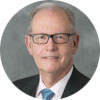Download PDF

We will be counting the COVID-19 pandemic tragedies for a long time. These include the serious illnesses and deaths, the economic damage, the foregone life celebrations (births, graduations, and funerals), loneliness in the isolated elderly, shortened tempers, assaults, child abuse, and suicide. (We have also witnessed some tremendous individual acts of kindness, with families and communities developing new ways of connecting.)
We will similarly be reviewing the scientific and medical victories and failures for a long time. The viral genome was discovered in weeks. The first vaccine will no doubt beat the prior development record by years! Our knowledge has exploded about virus transmission, susceptibility to environmental factors, and persistence on various materials. We have identified a few drugs with a positive effect on morbidity and mortality—and have eliminated others. Our intensivists have a better understanding about ventilation, cardiac functioning, and thrombotic events and have already improved survival.
Science and medicine have also had their fair share of failures—legitimate scientific ones and totally unforced errors—frequently because science became intertwined with ego, money, and politics. As a result, faith in scientific integrity, and the scientific process took some hits.
The Chinese National Health Commission at one point recommended injection of a traditional medicine containing bear bile. Nonscientists from various countries promoted chloroquine, hydroxychloroquine, and therapeutic UV light. In India, a health minister advocated that 10-15 minutes in the sun “kills any kind of virus.” And Venezuelan President Maduro touted a traditional Venezuelan tea that includes ginger and honey. Recently, the Brazilian government decided to cease providing COVID-19 public health statistics as being “not representative.”
Physicians and scientists were not exempt from a desire to rush to publication and ignore rigorous scientific review. Some hopped on the chloroquine bandwagon, pointing to old studies on related (but different) viruses and recommending wholesale adoption of the drug in advance of proper clinical trials. This caused drug shortages and some unnecessary difficulty in conducting proper studies. The studies were ultimately conducted, yielding some scientific clarity. Poorly controlled studies without careful analytics tarnished the reputations of several prestigious journals.
The FDA permitted antibody tests to reach the clinical marketplace without demanding proper evidence of sensitivity and specificity. Public health decisions were then made using incorrect data. Individuals tested positive, negative, and then positive again, unnecessarily raising the specter of reinfection—when the real issue was test inaccuracy.
Amid it all, nurses and physicians have been celebrated in the press and by evening community singing. The same sense of appreciation will hopefully extend to the careful, rigorous scientific process that will give us our ultimate victory over COVID-19. As a society, we apparently must periodically relearn that wishing for a treatment to work on the basis of anecdote does not make it so. Emerging from our tragic experiences of 2020 is a renewed (or new) respect for science, the weight of evidence, and trust in a properly articulated scientific process. Science need neither be obtuse nor wrapped in jargon. On the other hand, nuanced science cannot be oversimplified or overgeneralized without loss of its precision.
We ophthalmologists have had a unique scientific resource as we’ve managed COVID-19. By late February, Academy members were seeking evidence-based clinical guidance on innumerable issues as diverse as ‘what is coronavirus,’ ‘how can I protect my staff and patients,’ ‘what personal protective equipment do I need,’ ‘how do I disinfect my office,’ and ‘do antivirals work.’ The Academy reached out to a trio of incredibly talented ophthalmologist clinician-scientists who, among them, have expertise in cornea, external disease, retina, anterior segment surgery, molecular virology, public health, and prior viral epidemics. All three are the ultimate professional volunteers who, despite heavy clinical, teaching, and research responsibilities, gave up countless hours each week and weekend to ensure that the material on the Academy coronavirus web pages were updated at least daily and reflected careful science. The pages they authored were visited over 1.5 million times! Our entire profession owes a deep debt of gratitude to James Chodosh, MD, MPH (Harvard Medical School), Gary N. Holland, MD (UCLA), and Steven Yeh, MD (Emory University).